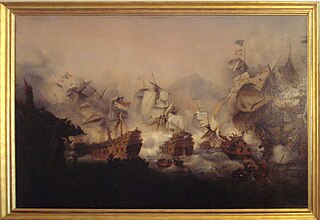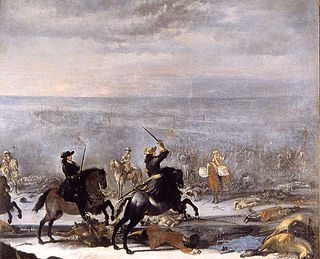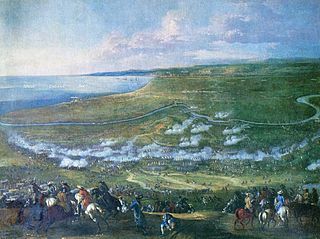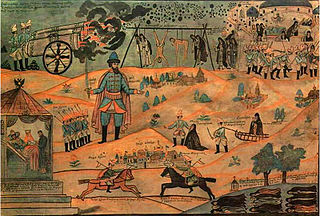 W
WThe naval Battle of Augusta, sometimes spelled Agosta and also known as the Battle of Etna, took place on 22 April 1676 during the Franco-Dutch War and was fought between a French fleet of 29 man-of-war, five frigates and eight fireships under Abraham Duquesne, and a Dutch-Spanish fleet of at least 27 warships besides several frigates and five fireships with a Spanish admiral in overall command and Dutch Lieutenant-Admiral-General Michiel de Ruyter commanding the squadron most involved in the fighting.
 W
WBacon's Rebellion was an armed rebellion held by Virginia settlers that took place in 1676. It was led by Nathaniel Bacon against Colonial Governor William Berkeley. It was the first rebellion in the North American colonies in which discontented frontiersmen took part. The alliance between European indentured servants and Africans disturbed the colonial upper class. They responded by hardening the racial caste of slavery in an attempt to divide the two races from subsequent united uprisings with the passage of the Virginia Slave Codes of 1705. While the farmers did not succeed in their initial goal of driving the Native Americans from Virginia, the rebellion resulted in Berkeley being recalled to England.
 W
WThe battle of Bornholm was a naval battle between a superior Swedish and a smaller Danish-Dutch fleet that was fought 25–26 May 1676 as a part of the Scanian War. The objective for both sides was naval supremacy in the southern Baltic Sea. The Swedish commander Lorentz Creutz sought to destroy the allied fleet and then land reinforcements in Swedish Pomerania to relieve the Swedish forces in northern Germany. The aim of the Danish fleet under Niels Juel was to prevent this reinforcement without being destroyed by the superior numbers of the Swedish forces.
 W
WThe Battle of Lund, part of the Scanian War, was fought on December 4, 1676, in an area north of the city of Lund in Scania in southern Sweden, between the invading Danish army and the army of Charles XI of Sweden. The Danish had an army of about 13,000 under the personal command of 31-year-old King Christian V of Denmark, aided by General Carl von Arensdorff. The Swedish army, which numbered about 8,000, was commanded by Field Marshal Simon Grundel-Helmfelt and the 21-year-old Swedish king Charles XI. It is one of the bloodiest battles in percent of casualties on both sides ever fought on European soil.
 W
WBattle of Żurawno took place between 25 September and 14 October 1676, during the war Polish-Ottoman War (1672–1676). The battle ended in a draw; treaty of Żurawno was signed in its aftermath.
 W
WThe Battle of Halmstad was fought on August 17, 1676, at Fyllebro, approximately five kilometers south of the town Halmstad in southwest Sweden. It was the last battle in Halland between Denmark and Sweden.
 W
WThe Lancaster Raid was the first in a series of five planned raids on English colonist towns during the winter of 1675 as part of King Philip's War. Metacom, known by English colonists as King Philip, was a Wampanoag sachem involved in leading and organizing Wampanoag warriors during the war. Teaming up with Nipmucs and Narragansetts, Wampanoag warriors were able to successfully raid the town of Lancaster, securing provisions and prisoners to help them carry onward into their winter offensive.
 W
WThe Battle of Öland was a naval battle between an allied Danish-Dutch fleet and the Swedish navy in the Baltic Sea, off the east coast of Öland on 1 June 1676. The battle was a part of the Scanian War (1675–79) fought for supremacy over the southern Baltic. Sweden was in urgent need of reinforcements for its north German possessions; Denmark sought to ferry an army to Scania in southern Sweden to open a front on Swedish soil.
 W
WThe naval Battle of Palermo took place on 2 June 1676 during the Franco-Dutch War, between a French force sent to support a revolt in the city of Messina against the Spanish rule in Sicily, and a Spanish force supported by a Dutch maritime expedition force.
 W
WThe Siege of Philippsburg was a siege of the fortress of Philippsburg during the Franco-Dutch War.
 W
WThe Revolt of the Three Feudatories, also known as the Rebellion of Wu Sangui, was a rebellion in China lasting from 1673 to 1681 in the Qing dynasty (1644–1912) during the early reign of the Kangxi Emperor. The revolt was led by the three lords of the fiefdoms in Yunnan, Guangdong and Fujian provinces against the Qing central government. These hereditary titles had been given to prominent Han Chinese defectors who had helped the Manchu conquer China during the transition from Ming to Qing. The feudatories were supported by Zheng Jing's Kingdom of Tungning in Taiwan, which sent forces to invade Mainland China. Additionally, minor Han military figures like Wang Fuchen and the Chahar Mongols also revolted against Qing rule. After the last remaining Han resistance was put down, the former princely titles were abolished.
 W
WThe Russo-Turkish War of 1676–1681, a war between the Tsardom of Russia and Ottoman Empire, caused by Turkish expansionism in the second half of the 17th century.
 W
WThe Scanian War was a part of the Northern Wars involving the union of Denmark–Norway, Brandenburg and Sweden. It was fought from 1675 to 1679 mainly on Scanian soil, in the former Danish and Norway provinces along the border with Sweden, and in Northern Germany. While the latter battles are regarded as a theater of the Scanian war in English, Danish, Norwegian and Swedish historiography, they are seen as a separate war in German historiography, called the Swedish-Brandenburgian War.
 W
WThe Solovetsky Monastery uprising was an uprising of Old Believer monks, known as the Raskol, of the northern Solovetsky Monastery against the policies of Tsar Aleksey I. The uprising involved the siege of the Solovetsky Monastery by the Tsar's forces over the years from 1668 to 1676.
 W
WThe naval Battle of Stromboli sometimes called the Second Battle of Stromboli or the Battle of Alicuri, took place on 8 January 1676 during the Franco-Dutch War between a French fleet of 20 ships under Abraham Duquesne and a combined fleet of 19 allied ships under Lieutenant-Admiral-General Michiel de Ruyter that lasted eight hours and ended inconclusively. The fleets fought again at the Battle of Augusta.
 W
WThe Sudbury Fight was a battle of King Philip's War, fought in what is today Sudbury and Wayland, Massachusetts, when approximately five hundred Wampanoag, Nipmuc, and Narragansett Native Americans raided the frontier settlement of Sudbury in Massachusetts Bay Colony. Disparate companies of English militiamen from nearby settlements marched to the town's defense, two of which were drawn into Native ambushes and suffered heavy losses. The battle was the last major Native American victory in King Philip's War before their final defeat in southern New England in August 1676.
 W
WThe Battle of Turner's Falls or Battle of Great Falls; also known as the Peskeompscut massacre or the "Wissantinnewag massacre", was fought on May 19, 1676, during King Philip's War, in present-day Gill, Massachusetts, near a falls on the Connecticut River. The site is across the river from the village of Turners Falls. This was one of the most important conflicts of King Philip's War, as it marked a turning point in the conflict that would eventually lead to the war's end.